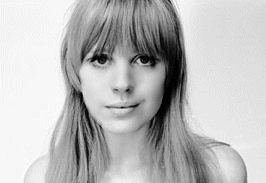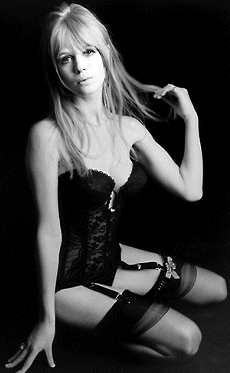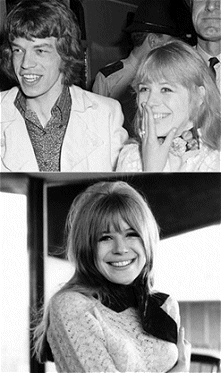Sixties
City presents
a wide-ranging series of
articles on all aspects of the Sixties, penned by the creator of the iconic
60s music paper Mersey
Beat
|
Sixties
City presents
a wide-ranging series of
articles on all aspects of the Sixties, penned by the creator of the iconic
60s music paper Mersey
Beat
|
||||||
|
| Born in
Hampstead on 29th December 1946, Marianne Faithfull was the daughter of
Baroness Erisso von Sacher-Masoch and Dr Glynn Faithfull, a psychologist.
The family originally lived in Ormskirk on the outskirts of Liverpool while
Marianne’s father worked on his doctorate at Liverpool University. When
Marianne was six years old her parents separated and she attended St. Joseph’s
Convent School in Reading. At the age of 17 she met John Dunbar at a Valentine’s Ball in Cambridge. The two began a relationship and John introduced her to Paul McCartney during visits to Jane Asher’s parents' house in Wimpole Street. While John was abroad she attended a birthday party for actress Adrienne Posta where she was spotted by Andrew Loog Oldham, manager of the Rolling Stones, who considered she had a ‘virginal’ appearance that would contrast with the Stones’ image. He was to dub her ‘an angel with a big bust'. He signed her up and she had immediate record success with her debut disc ‘As Tears Go By’, penned by Mick Jagger and Keith Richards.She was still attending Convent School at the time of the record release. She married Dunbar on 6th May 1965 at Cambridge, with Pete Asher as Best Man. The couple moved into a flat at 29 Lennox Gardens, Knightsbridge, and one of her regular visitors was Paul McCartney. Paul told her he’d give her a song and actually wrote one for her called ‘Etcetera’, but decided it wasn’t good enough to record. As a result, Marianne became Paul’s personal choice to record ‘Yesterday’ and, during an evening at a party, he played her an acetate of his version. |
 |
 |
When she
recorded ‘Yesterday’ on 11th October 1965 he attended her recording session
at Decca Studios and the record was released on 22nd October. She was booked to appear and perform the song on the Granada TV special ‘The Music of Lennon and McCartney’ where Paul McCartney began singing the number for 22 seconds and the camera then moved to Marianne, who completed the song. The eighteen year old singer was three months pregnant at the time, so the camera focussed on a head and shoulder shot throughout. However, it was singer Matt Monro who reached No.8 in the British charts with the number while Marianne barely scraped in, her highest position being No.36. Her son Nicholas was born on 10th November 1965. Marianne then left her husband to live with Mick Jagger and was later to tell the New Musical Express, “My first move was to get a Rolling Stone as a boyfriend. I slept with three and decided the lead singer was the best bet". In February 1965 her mother approached Brian Epstein and asked him to manage Marianne, but he told her he would not manage another female singer as long as he had Cilla Black. Marianne and Mick embarked on a lengthy affair, even though she was married and had a son. When she became pregnant by Jagger they were expecting a baby girl which they named Corrina, but Marianne miscarried after seven months while staying at Jagger’s house in Ireland. He was eventually to leave her for Chrissie Shrimpton. ‘As Tears Go By was one of four Top 10 chart hits for Marianne, the others being ‘Come And Stay With Me’, ‘This Little Bird’ and ‘Summer Nights'. She also entered the charts with ‘Yesterday’, ‘Is This What I Get For Loving You’ and ‘The Ballad of Lucy Jordan'. For a time she became an actress, appearing on stage and in films such as ‘I’ll Never Forget What’s ‘is Name’ and ‘Girl On A Motorcycle'. Marianne became dependent on drugs and ended up a registered heroin addict, living in a squat. She had several broken relationships, made a number of suicide attempts and entered detox clinics on several occasions. In 1979 she issued the critically acclaimed album ‘Broken English’, but spent her £90,000 royalties on a three-month binge. In 1990 her marriage to American writer Giorgio della Terza collapsed and she went to live in isolation in Shell Cottage in Eire. In 1995 Island Records issued her album ‘A Secret Life’ and the following year Marianne issued ‘20th Century Blues’, an album of songs by Kurt Weill and Bertholt Brecht. |
 |
|
Article
|